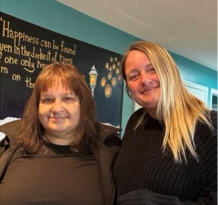
What Are My Rights?
What Are My Rights?
Summary of Rights of Persons with Intellectual Disabilities or Autism
(Based on 34-B MRSA Section 5601-5608)
There is a state law that says people with Intellectual Disabilities or Autism have certain rights. There are some things you have the right to do, and some things people cannot do to you or make you do.
It is important for you to know what your rights are so you can speak up for what you want, and help speak up for other people too. Only your guardian can change these rights for you, and then only sometimes. If you aren't sure what your rights are, ask! You can ask a supporter, your caseworker or the advocate. You can call the advocate in Portland at 822-0270.
Here is a summary of the law. If you would like to see the whole law, please ask and we will give you a copy and help you understand it:
-
You have a right to be treated with respect and dignity.
- You have the same rights as all other citizens of the state and the country, unless the court has said you do not.
-
You have the right to privacy and to be treated humanely.
- No one can abuse you, keep you away from things you need, or take advantage of you.
-
You have the right to be told what the rules are where you live and where you work.
- You need to be told what will happen if you break the rules.
- You can help to make the rules.
-
You have the right to freedom of religion.
- You may go to the church you want and pray if you-want.
- No one can make you go to a church if you don't want to.
-
You have a right to communication.
- You can receive your own mail. No one can read your mail unless you say it's okay. No one can stop you from writing or mailing letters.
- You can use the telephone to call anyone you want. Nobody can listen to your phone calls unless you say it's okay. You cannot make calls you can't pay for.
- You can have visitors. No one can hang around when you have visitors unless you say it's okay. No one can make you have visitors you don't want to have.
-
You have a right to look for a job.
- You have a right to be paid for work you do.
- You have a right not to be denied a job because of your disability.
-
You have a right to vote.
- If you need help, you may choose someone to go into the voting booth with you.
- You don't have to tell anyone who you voted for unless you want to.
-
You have a right to your things.
- No one can take your things away from you, unless you are going to hurt someone with them. There are rules about when they can be taken away and for how long.
-
You have a right to be active in the community and have access to places where you can get exercise.
- including the use of available indoor and outdoor facilities and equipment.
-
You have a right to choose or decline social activities.
- This includes changing your schedule
- Social interaction with others such as who you choose to talk to
- Where you choose to sit
-
You have a right to nutritious food.
- If someone fixes your meals, you have a right to be given enough healthy food to eat.
- No one can make you miss a meal to punish you.
-
You have a right to medical treatment.
- You can see a doctor, psychiatrist, counselor or a dentist. You can ask them to explain what they are going to do so you can understand it.
- You have a right to refuse treatment you don't want.
-
You have a right to be free from forced sterilization.
- Even your guardian cannot force you to be sterilized unless you agree or the court says you have to.
-
You have a right to be free from restraint.
- No one can give you medicine to punish you or just to make you sleepy or quiet.
- No one may hit you or hurt you.
- No one may lock you alone in a room.
- No one may hold you with force or tie you up to stop you from doing something, unless you are going to hurt yourself or someone else. Even then, there are rules about how they can touch you.
-
You have a right to Behavioral support, modification, and management.
- Including Therapeutic devices or interventions
Summary of the Rights of Recipients of Mental Health Services – Community Based Services
This is a summary of your rights as a recipient of community based services under the Rights of Recipients of Mental Health Services. You have a right to obtain a full copy of the rights from this agency or from the Department of Health and Human
Services, Substance Abuse and Mental Health Services, 11 State House Station-41 Anthony Ave., Augusta, Maine 04330, Tel # (207) 287-2595, TTY Users: Dial 711 (Maine Relay).
If you are deaf or do not understand English, an interpreter will be made available to you so that you can understand your rights.
- Basic Rights: You have the same civil, human, and legal rights which all citizens have. You have a right to be treated with courtesy and full respect for your individuality and dignity.
- Confidentiality and Access to Records: You have the right to have your records kept confidential and only released with your full informed consent. You have the right to review your record at any reasonable time. You may add written comments to your record to clarify information you believe is inaccurate or incomplete. No one else can see your record unless you specifically authorize them to see it, except in instances described in the complete rights book.
- Individualized Treatment or Service Plan: You have the right to an individualized plan, developed by you and your worker, based upon your needs and goals. The plan must be in writing and you have the right to a copy. The plan needs to specifically detail what everyone will do, the time frames in which the tasks and goals will be accomplished and how success will be determined. The plan must be based upon your actual needs and, if a needed service is not available, detail how your need will be met.
- Informed Consent: No services or treatment can be provided to you against your will. If you have a guardian, he or she is authorized to make decisions without your consent. You have the right to be informed of the possible risks and anticipated benefits of all services and treatment, including medications, in a manner which you understand. If you have any questions, you may ask your worker or anyone else you choose before making decisions about treatment or services. If a guardian has been authorized to make decisions for you, the guardian has the right to be fully informed of all risks and benefits or proposed treatment or services.
- Assistance in the Protection of Rights: You have the right to appoint a representative of your choice to help you understand your rights, protect your rights or help you work out a treatment or service plan. If you wish a representative, you must designate this person in writing. You can have access to the representative at any time you wish and you can change or cancel the designation at any time.
- Freedom from Seclusion and Restraint: You cannot be secluded or restrained in the community setting.
- Right to File a Grievance: You have the right to bring a grievance to challenge any possible violation of your rights or any questionable practices. You have the right to have your grievance answered in writing, with reasons for the decisions. You may appeal any decision to the Office of Substance Abuse and Mental Health Services. You may not be punished in any way for filing a grievance. You cannot be retaliated against for filing a grievance. For help with filing a grievance, contact SAMHS Grievance Coordinator, (207) 287-2595, TTY Users: Dial 711 (Maine Relay), 11 State House Station-41 Anthony Avenue, Augusta, Maine 04333, or call Disability Rights Maine, 24 Stone Street, Ste 204, Augusta Maine 04330, Tel # 1-800-452-1948 (V/TTY).







